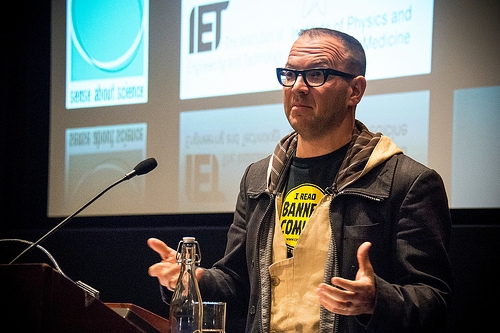By Margaret Harris
I’ve never been a fan of the slogan “Information wants to be free”. As a journalist and former scientist, I know that the process of creating and disseminating information is definitely not free, and I’m sceptical about the economic alchemy that would supposedly make it that way. So when I saw that this year’s Sense About Science lecture was entitled “We Get to Choose: How to Demand an Internet That Sets Us Free”, I nearly stayed away.
As it turns out, a more accurate title for the London-based charity’s annual bash would have been “Why Digital Rights Management is Bad and Why You Should Care”, and by the end, the speaker – science-fiction author and blogger Cory Doctorow – had pretty much won me over.
Speaking to an audience that nearly filled the wood-panelled lecture hall at the Institution of Engineering and Technology in London, Doctorow explained that Digital Rights Management (DRM) is the legal and technical system that, inter alia, tries to prevent people from copying DVDs and prosecutes them if they do. The supposed purpose of DRM is to keep people from ripping off digital content – books, songs, films, computer games and so on – and Doctorow acknowledged that, as a content creator himself, he’s sympathetic to that goal.
The problem, Doctorow said, is that DRM comes with some extremely unpleasant side effects. The difficulty with anti-copying measures is that “there is no physical basis for a computer that is ‘Turing complete minus one’.” In other words, you can’t make a machine that runs any program except for a program that copies DRM-protected content or does something else that corporations or governments find undesirable.
Instead, DRM legislation makes it illegal for people to share information about how to overcome DRM protections, and allows companies to install spyware that tells them when users are violating DRM. This, in Doctorow’s view, opens up a huge can of worms. People don’t actually want DRM restrictions or spyware on their devices; as he put it, “Nobody got up this morning and said, ‘I wonder if there’s a phone out there that really restricts my music?’” So users will inevitably try to get rid of them, and in order to prevent them from doing so, tech firms need to make spyware and DRM code hard to find and delete.
But the techniques used to do that also have more sinister purposes, with implications that stretch far beyond the future of the entertainment industry. According to Doctorow, makers of computer viruses have already started to exploit DRM-induced holes in the digital “immune system”, and those same holes could threaten human health as well. After all, he said, “we put our bodies in computers and we put computers in our bodies”, citing cars and pacemakers as examples, and DRM limits our ability to understand what those computers are doing. For that reason, Doctorow says he wants to see DRM scrapped – even if the resulting absence of copy protection means that he has to stop writing and get what he called “a real job”.
And the slogan “Information wants to be free”? It turns out Doctorow doesn’t like it much either. During his lecture, he joked that he had spent the recent Bank Holiday weekend hanging out with Information, and at the end of it, Information confessed that it does not want to be free: what it really wants, more than anything in the world, is for people to stop anthropomorphizing it. “Information does not want to be free,” Doctorow concluded. “But people want to be free.”
If you didn’t make it to London to hear Doctorow in person, you can listen to an audio recording of the entire 73-minute lecture here.

If one adds layer on layer of forbiddenness in the systems, the result will tend towards a convoluted clumsiness inacceptable to most of the users.
The freedom of information sharing belong into freedoms of people. I presume, every censorship is the manifestation of principal imperfection of contemporary world. Which gives a clue, how the ideal world should appear: it should have all reasons for censorship and prohibition of free information spreading removed.
I believe friends fighting for this cause are fighting a losing battle.
At the very best they would end up recovering the top tier of the rights to keep our information go public, yet the underlying layers and tiers undearneath prying eyes of governments and agencies would always be beyond our own control in a world of persistent monitoring of everything except our dreams(so far,Fear that to be robbed soon)